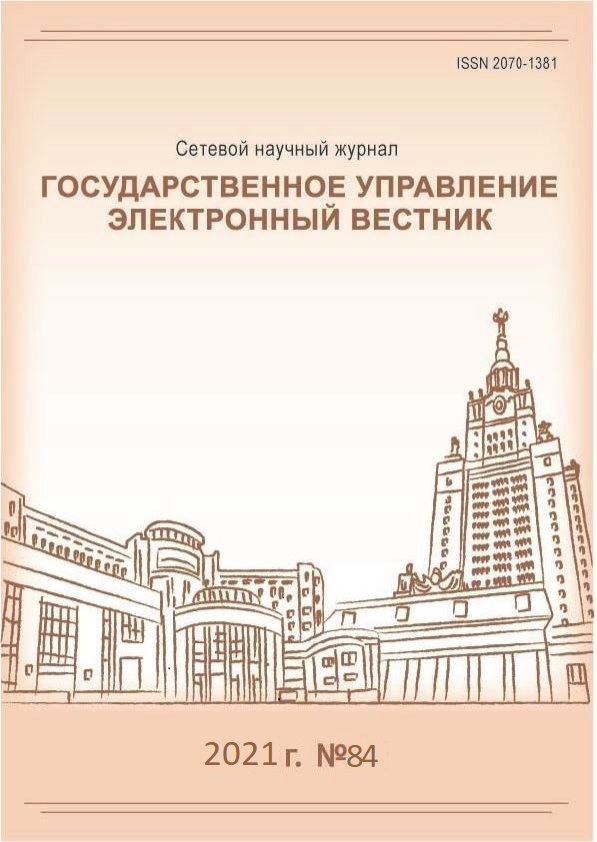On the Outlook for the Third Wave of Digital Era Governance
Keywords:
Digital era governance, digital platform, social network, Internet of people, national information systemAbstract
The authors investigate Digital Era Governance concept from the standpoint of dominant technological trends of the last two decades. Since the concept itself is closely linked to the development of the world wide web and the Internet, the authors distinguish two periods that can be attributed to the first and the second wave of Digital Era Governance. The first period is the first decade of the century, during which Internet has spread across the globe and sparked the birth of many digital portals and platforms. The second period is the second decade of the century, during which Internet went mobile and enabled rapid growth of social networks. Two waves of Digital Era Governance can therefore be associated with two major drivers — digital platforms and social networks. Keeping in mind the fact that social networks only exist in imagination of their users and technically on the inside represent nothing else but digital platforms with centralized data storage, the authors conclude that digitization is not yet out of the woods of “platform era”. Nevertheless, digitization has reached the point at which the looming end of platform era can be predicted and announced to happen sometime over the next ten years. The outlook for the “third wave” of Digital Era Governance is investigated in connection with Facebook’s 10 years roadmap and rapidly growing interest to such technological concepts as intelligent cyber-physical human systems, Internet of things, multiagent networks, and Internet of people. Third wave’s advent would end “platform era” and start “network era” with platforms to remain one of the key elements of any control system. Internet of people, technically rooted to multiagent networks, would shape new types of control systems and change the ways digital governance is performed. Renewal of decentralized approaches to public administration may be anticipated, once the third wave has brought digital transformation upon the governments.
References
Глазьев С.Ю. Информационно-цифровая революция // Евразийская интеграция: экономика, право, политика. 2018. № 1. С. 70–83.
Городецкий В.И. Поведенческие модели кибер-физических систем и групповое управление: основные понятия // Известия ЮФУ. Технические науки. 2019. № 1. С. 144–162. DOI: 10.23683/2311-3103-2019-1-144-162.
Городецкий В.И., Скобелев П.О. Цифровая платформа кибер-физических систем // Сборник трудов XIII Всероссийского совещания по проблемам управления ВСПУ-2019. М: ИПУ РАН, 2019. С. 2339–2344.
Клименко А.В. Десятилетие административной реформы: результаты и новые вызовы // Вопросы государственного и муниципального управления. 2014. № 1. С. 8–51.
Косоруков А.А., Кшеменецкая М.Н. Модель цифрового управления на современном этапе развития государственного управления // Социодинамика. 2019. № 1. С. 57–69. DOI: 10.25136/2409-7144.2019.1.27232.
Купряшин Г.Л., Шрамм А.Е. О принципах датацентризма, сетецентризма и командноцентризма в контексте информатизации государственного управления // Государственное управление. Электронный вестник. 2019. № 76. С. 211–242. DOI: 10.24411/2070-1381-2019-10010.
Купряшин Г.Л., Шрамм А.Е. О проблемах информатизации в бюрократических системах и развитии общегосударственных информационных систем // Государственное управление. Электронный вестник. 2020. № 80. С. 22–48. DOI: 10.24411/2070-1381-2020-10062.
Липов В.В. «Сексуальный, но бедный»: информационные платформы и парадокс открытости в цифровой экономике // Философия хозяйства. 2020. № 3. С. 152–167.
Осипов Ю.М., Юдина Т.Н., Гелизханов И.З. Информационно-цифровая экономика: концепт, основные параметры и механизмы реализации // Вестник московского университета. Экономика. 2019. № 3. С. 41–60.
Смотрицкая И.И. Цифровизация государственного управления как новый этап институциональных реформ // Институциональные аспекты повышения качества государственного управления в контексте новых стратегических вызовов. М.: Институт экономики РАН, 2019. С. 10–25.
Bloom N., Garicano L., Sadun R., Van Reenen J. The Distinct Effects of Information Technology and Communication Technology on Firm Organization // Management Science. 2014. Vol. 60. Is. 12. P. 2859–2885. DOI: https://doi.org/10.1287/mnsc.2014.2013.
Dunleavy P., Margetts H., Tinkler S. New Public Management Is Dead — Long Live DigitalEra Governance // Journal of Public Administration Research and Theory. 2006. Vol. 16. Is. 3. P. 467–494. DOI: https://doi.org/10.1093/jopart/mui057.
Margetts H., Dunleavy P. The Second Wave of Digital-Era Governance. A Quasi-Paradigm for Government on the Web // Philosophical Transactions of the Royal Society. 2013. Vol. 371. Is. 1987. DOI: https://doi.org/10.1098/rsta.2012.0382.
Stephens-Davidowitz S. Everybody Lies: Big Data, New Data, and What the Internet Can Tell Us About Who We Really Are. New York: HarperCollins Publishers, 2017.

